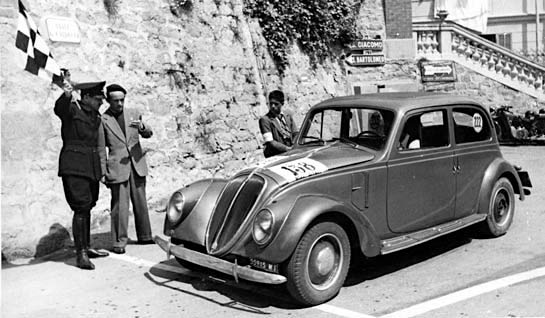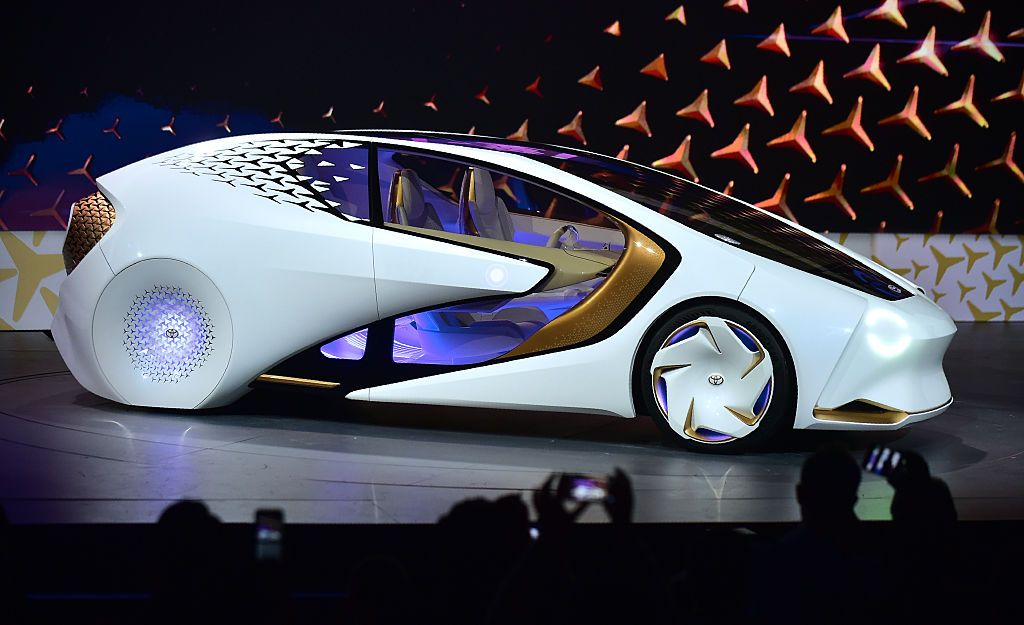I don't know much about the subject of this post, the Fiat 1500 version built 1935-1939. The English Wikipedia entry for it is here, and it, in turn, has links to entries in others languages that might have additional information.
The claim to fame for the 1500 introduced 9 November 1935 at the Salone dell'automobile di Milano is that its shape was wind tunnel tested, apparently the first for a European sedan. The first comparable American car was the 1934 Airflow from Chrysler Corporation.
Mid-1930s streamlining was half-hearted in that separate fenders, running boards and other non-aerodynamically efficient details were usually retained.
This image puzzles me. The caption associated with it on the Internet has this as a 1936 Fiat 1500 Berlina Speciale. However, this car has details not found on Web images of other Fiat 1500s from that era. Example items include the lack of ventipanes in the forward side window assemblies, presence of rear wheel covers, differently shaped headlight assemblies, the C-pillar position of the turn indicator wand, exposed door hinges, and the horizontal alignment of the door handles. Might this have been a prototype rather than a production model?
This is said to be a Fiat 1500 B from 1938 or 1939. Compare it to the car shown in the previous image.
Frontal view of a Fiat 1500. The shape of the grille is essentially the same as that of the aerodynamic Peugeot 402 introduced for 1936 on 13 October 1935 at the Paris salon -- interesting case of simultaneous development, though I have seen no reference of wind tunnel testing for the 402. This is a wartime photo: note the blackout headlight covers. I'm not sure if this was taken in liberated or occupied Italy. That's because of the man's uniform. The general cut of his jacket (the lower pockets, especially) is Italian, but the collar and details around the upper chest seem German.
This is a 1937 Peugeot 402 Éclipse, a car with a retractible metal top. Compare its grille to the Fiat 1500's. (1936 402s had the same grille design, so this camparison of 1935-36 vintage grilles is legitimate.)
A Fiat 1500 competing in the 1937 Bartolomeo hill-climb. This photo has a better view of the headlight assemblies. Note that the bumper is in one piece. Apparently only 1936 1500s had divided front bumpers.
Comments from sharp-eyed readers are welcome regarding both the car in the top image and the uniform seen in the wartime photo.
I don't know much about the subject of this post, the Fiat 1500 version built 1935-1939. The English Wikipedia entry for it is here, and it, in turn, has links to entries in others languages that might have additional information.
The claim to fame for the 1500 introduced 9 November 1935 at the Salone dell'automobile di Milano is that its shape was wind tunnel tested, apparently the first for a European sedan. The first comparable American car was the 1934 Airflow from Chrysler Corporation.
Mid-1930s streamlining was half-hearted in that separate fenders, running boards and other non-aerodynamically efficient details were usually retained.
This image puzzles me. The caption associated with it on the Internet has this as a 1936 Fiat 1500 Berlina Speciale. However, this car has details not found on Web images of other Fiat 1500s from that era. Example items include the lack of ventipanes in the forward side window assemblies, presence of rear wheel covers, differently shaped headlight assemblies, the C-pillar position of the turn indicator wand, exposed door hinges, and the horizontal alignment of the door handles. Might this have been a prototype rather than a production model?
This is said to be a Fiat 1500 B from 1938 or 1939. Compare it to the car shown in the previous image.
Frontal view of a Fiat 1500. The shape of the grille is essentially the same as that of the aerodynamic Peugeot 402 introduced for 1936 on 13 October 1935 at the Paris salon -- interesting case of simultaneous development, though I have seen no reference of wind tunnel testing for the 402. This is a wartime photo: note the blackout headlight covers. I'm not sure if this was taken in liberated or occupied Italy. That's because of the man's uniform. The general cut of his jacket (the lower pockets, especially) is Italian, but the collar and details around the upper chest seem German.
This is a 1937 Peugeot 402 Éclipse, a car with a retractible metal top. Compare its grille to the Fiat 1500's. (1936 402s had the same grille design, so this camparison of 1935-36 vintage grilles is legitimate.)
A Fiat 1500 competing in the 1937 Bartolomeo hill-climb. This photo has a better view of the headlight assemblies. Note that the bumper is in one piece. Apparently only 1936 1500s had divided front bumpers.
Comments from sharp-eyed readers are welcome regarding both the car in the top image and the uniform seen in the wartime photo.

















EmoticonEmoticon